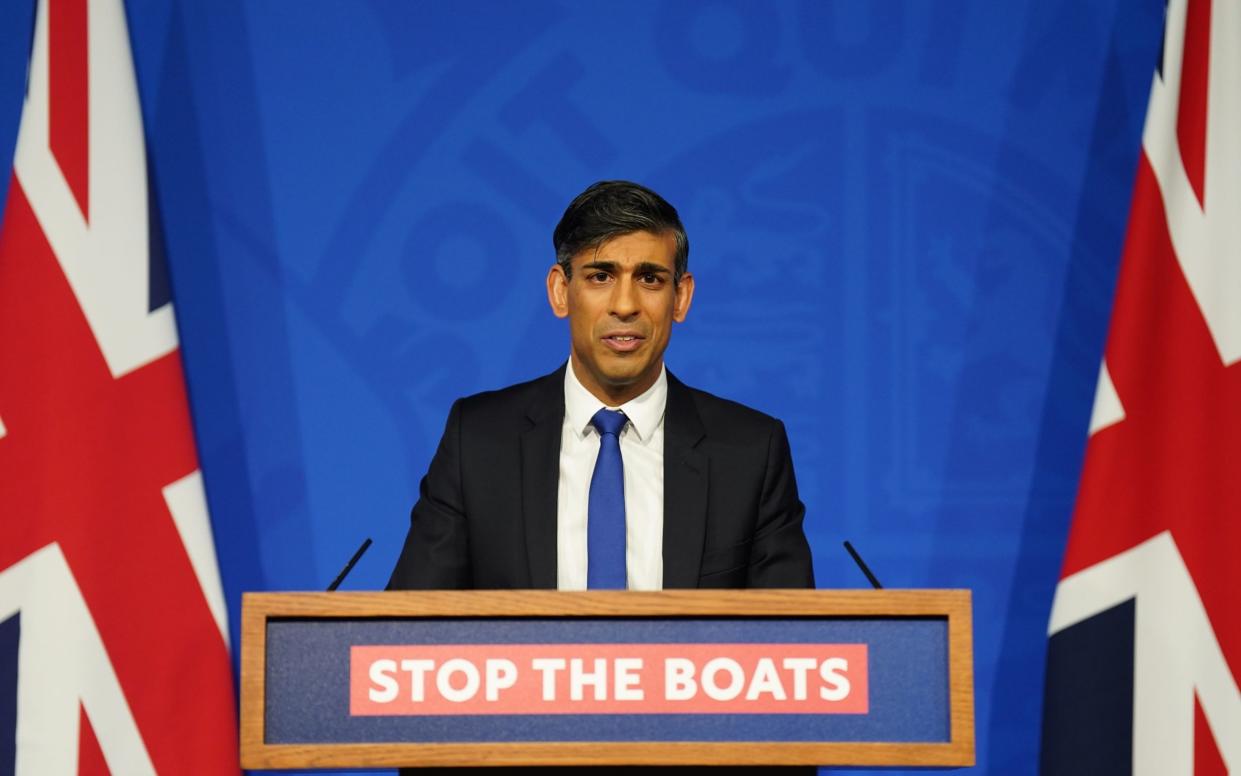Letters: Toothless Tories have broken Brexit promises on immigration control

- Oops!Something went wrong.Please try again later.
SIR – The Rwanda Bill is nothing more than an expensive confidence trick (Letters, December 13). Immigration lawyers will exploit its loopholes and its deterrent effect will be negligible.
Not one Tory MP who pointed this out voted against it (report, December 13). All of them have been exposed as toothless, naively trusting that the Government will improve something that is fatally flawed.
Voters in Red Wall seats and the rest of us who thought Brexit meant we would control our borders have been betrayed.
Now we can only turn to Reform UK and watch as the Tory party is obliterated at the election.
John Hicks
Manchester
SIR – The main problem with both legal and illegal immigration to the UK is the speed of processing arrivals. This bottleneck is causing paralysis – and then there is the ever-increasing cost of accommodating people who are stuck in limbo and would otherwise be able to contribute to our economy. Sir Keir Starmer recognises this and promises to address the issue if elected (report, December 13). Unfortunately, it could still mean a delay of nearly two years before results are seen, during which time the situation would almost certainly deteriorate.
Rishi Sunak is hell-bent on getting the Rwanda policy off the ground, despite the fact that it is going to be ineffective, expensive and may yet prove unenforceable. It is unlikely that more than a few hundred people will ever be sent on planes – so where is the deterrent? In a numbers game like this, would-be immigrants are unlikely to be deterred by those odds (and those asked in Calais have said as much).
Mr Sunak should fix the processing bottleneck and start sending back people who have no legal right to be here. Only then will the flow of small boats be reduced further and genuine asylum seekers quickly identified and helped.
Howard March
Birmingham
SIR – Suella Braverman, the former home secretary, says that multiculturalism has failed (Interview, December 10). What, then, are we to replace it with?
The only option would appear to be that we are forced to live in a monocultural society. And what would Mrs Braverman permit in such a society? Would we be allowed to eat Indian, Mexican or Italian food? Or is roast beef, washed down with ale, the only order of the day? Can we listen to reggae music, dance salsa or play the ukulele? Would French films, Greek philosophy or Russian literature be acceptable? Is the wearing of headscarves, Levi’s jeans and ponchos to be banned? Will yoga classes, meditation retreats and acupuncture treatments be cancelled?
If variety is the spice of life, how good will it taste once we are all forced to conform to Mrs Braverman’s vision of a single culture?
Mark Dunn
Bristol
The cost of Covid
SIR – The moment that showed the misguided thrust of the Covid Inquiry was the remarkable slap-down of Rishi Sunak, the Prime Minister, by Hugo Keith KC, with his withering line: “Let’s please not go into the issue of tax burdens” (Leading Article, December 12). Winston Churchill or Margaret Thatcher would not have let that pass without a proper riposte.
Surely the whole point of the inquiry is to examine the relationship between the health and mortality dangers of the pandemic and the economic measures taken to mitigate those, such as furlough. This is vital for establishing what policy should be when the next pandemic arrives. The former chancellor was right to raise the cost of his policies.
I’m afraid that many of us are concluding that the inquiry is little more than a hideously expensive witch-hunt, in which the benighted ministers of the day are torn apart. The presiding lawyers have succeeded in portraying almost all Covid deaths as the fault of the Government, when arguably who caught Covid and how badly was in many cases a lottery.
The Earl of Balfour
Burpham, West Sussex
SIR – My 97-year-old mother, who was as mentally alert as you can be on a low-dose morphine regime, died in a nursing home on April 4 2020. She was assessed as a Covid death, despite not having been tested, because others in the facility “had the virus”.
At that age you have to die of something, so I did not question it at the time. However, in view of the subsequent reports of exaggeration of the death toll, I wish I had. Only five members of immediate family were allowed to attend her funeral service, which took place at a woodland burial site on top of a hill in the open air.
As the outrageous constraints continued, I took comfort from the fact that she was not alive to suffer alone, with us unable to visit her for months.
The Covid Inquiry would do far better investigating exactly what these and other ridiculous restrictions actually achieved. Poring over vitriolic communications between the scientists and decision-makers who dreamt them up, and conducting “gotcha” interviews with key players who have already submitted extensive written evidence, seem like little more than grandstanding.
Ian Goddard
Wickham, Hampshire
In on the act
SIR – Geraldine Wills (Letters, December 12) should check the programme at her local cinema or arts centre, where she could well find recorded performances of opera, ballet and theatre are showing.
It’s not quite the same as a live performance, but it’s a much easier and cheaper option.
Jane Baldwin
Sinnington, North Yorkshire
Speedy withdrawal
SIR – The last bank in the market town of Bakewell is to close in February 2024 (report, December 1).
The alternative is to travel 10 miles to the nearest remaining branch in Chesterfield town centre, where parking is difficult.
My practice is resigned to having to send two members of staff – one to drive and the other to nip into the bank to deposit cheques and cash.
We are contemplating the purchase of a 1960s Jaguar Mark 2, so that the driver can hover nearby until the depositor reappears and a swift getaway can be made.
Alastair Sneddon
Bakewell, Derbyshire
Assisted dying law
SIR – His Honour Charles Wide KC (Letters, December 9) outlines the difficulties of enshrining a right to die in law. When polled, however, a majority of the population support it in some form, but the minority are determined to impose their will on the rest of us.
Judge Wide states that he has been a volunteer hospice chaplain, so it seems reasonable to assume he has a firm religious conviction. There is great reluctance among the religious community to admit there is a moral case for assisted dying. Such reluctance seems admirable, even enviable, but I do not share it.
The need for a High Court review of all cases of assisted dying – a protection Judge Wide describes as “a chimera” – was introduced into the Falconer Bill as one of many wrecking tactics and was unfortunately conceded so that the Bill could make progress.
I agree with Judge Wide that it would not be practicable in the current UK legal system to review all cases and I do not know of other jurisdictions where this is required. The overwhelming majority of requests for assisted dying are from people who are suffering unbearably with a terminal illness, and it does not need the opinion of a judge to confirm that it is reasonable for them to request release.
In a very few cases the decision is more difficult, and in these the medical assessors may well wish to secure a legal opinion.
Dr Nicholas Delano Barnes
Cambridge
Useful pyjamas
SIR – Bill Welland (Letters, December 12) asks what to put in the pocket of his Marks & Spencer pyjama trousers. The answer is obvious: a handkerchief.
I was delighted to discover my women’s pyjamas had pockets in the trousers as well as a breast pocket. If I am careful, I can even put my Kindle in one pocket and my reading glasses in the other when I go upstairs to bed.
Cynthia Denby
Edgware, Middlesex
SIR – I wouldn’t be without my pocket in my nightdress.
I go downstairs in the morning to make the tea, and while the kettle is boiling I wrap up a chocolate digestive in kitchen towel to put in my pocket. On Saturdays and Sundays, I make that two. Then I collect my Telegraph and return to bed, looking forward to reaching the crossword.
But I can’t linger as the chocolate melts – and what a mess it makes.
Helen Cann
Poundbury, Dorset
In search of a traditional Advent calendar

SIR – How refreshing to hear young Guy Kelly’s view on traditional Advent calendars (Magazine, December 9). I too want pictures that take us through the Christmas story, but have given up hope of finding such a calendar. Perhaps Mr Kelly could reveal his source, as even the one produced by my local cathedral contains pictures of a modern Christmas.
My husband and I try to guess what the picture will be before opening each day. Quite often now we struggle to see any relevance to Christmas, traditional or modern-day. It seems only the picture behind window 24 remains (mostly) reliable.
Please will someone manufacture a calendar to remind people what Christmas is all about?
Suzanne Wynn
Blagdon, Somerset
Local people deprived of affordable housing
SIR – Annie White (Letters, December 13) feels it is unfair for her to pay double council tax on her second home in Devon because for 12 weeks of the year she boosts the local economy by supporting pubs, restaurants and shops.
But there are 52 weeks in the year and the local economy has to survive on local trade for the remainder.
If the second home owners did not inflate house prices, local people would have more cash to spend and – importantly – could find affordable rented accommodation so they could work in these amenities.
Then Mrs White could visit and enjoy the benefits of a vibrant economy that gives the area its charm and character.
Dr David Walters
Burton Bradstock, Dorset
SIR – The whole structure of second home ownership needs to be improved. Councils in Scotland will soon be able to double the rates for a second home. This money needs to be ploughed back into affordable housing.
At present the epithet is meaningless as most remains unaffordable to those who live and work in the local area.
James Bishop
Wincanton, Somerset
Letters to the Editor
We accept letters by email and post. Please include name, address, work and home telephone numbers.
ADDRESS: 111 Buckingham Palace Road, London, SW1W 0DT
EMAIL: dtletters@telegraph.co.uk
FOLLOW: Telegraph Letters on Twitter @LettersDesk
NEWSLETTER: sign up to receive Letters to the Editor here

